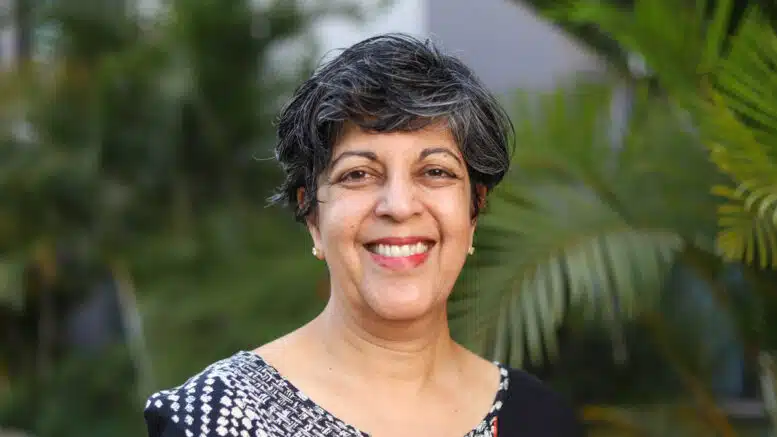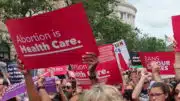By Rachel Crumpler
Since the Dobbs decision in June 2022, nearly half of states in the United States — including North Carolina — have curtailed access to abortion by implementing increased restrictions.
The significant rollback in abortion legality throughout much of the country puts the United States in sharp contrast to the global trend of loosening abortion laws and increasing protections for abortion rights.
Anu Kumar, president and CEO of Ipas, has been thinking deeply about abortion access globally for more than 20 years. Ipas is a Chapel Hill-based reproductive justice organization that works on five continents to expand abortion access globally. In 2023, 456,917 people received abortion services in 25 countries at Ipas-supported health facilities.
NC Health News spoke with Kumar about how U.S. abortion restrictions compare to the global abortion landscape. The conversation has been edited for length and clarity.
NC Health News: Tell me about Ipas and the work you do. Why focus on abortion access globally?
Kumar: Ipas was started in 1973, so a little over 50 years ago. 1973 was an important year. It was the ruling that brought us Roe v. Wade. It also brought the Helms Amendment [introduced by Sen. Jesse Helms from North Carolina]: a complete ban on the use of federal foreign assistance funds for abortion-related services and information. The United States is the only nation that singles out an essential medical procedure — abortion — in its foreign aid. It’s because of the Helms Amendment that Ipas was formed and our mission was really honed. We now work on five different continents.
Roughly half of [the world’s annual 73 million abortions] are unsafe. We know that thousands of women [annually] die from unsafe abortion, and millions more are injured and suffer as a result of unsafe abortion. Unsafe abortion is one of the five leading causes of maternal mortality, and it’s the one that can be most easily eliminated. We have known for decades how to prevent these deaths, and that’s one of the things that Ipas has been focused on.
NCHN: What’s your approach when you’re working in countries to reduce these deaths?
Kumar: Our approach is to think about the ecosystem that surrounds people who are looking for care and the factors that impact or impede their ability to get that care — things like having trained health providers and health systems. It can include policies, laws and regulations. It can include social norms. Very often abortion is stigmatized, and that stigma will prevent people from actually accessing information as well as care.
When we’re talking about maternal mortality, not just abortion-related mortality, there are three main things that are linked and need to happen. One, people need to have comprehensive sexuality education. The second is that people need to have access to contraception — high-quality modern methods of contraception. And the third is that people need to have access to abortion care because contraception is not infallible. And to me, these three things together — the trifecta, or sometimes I’ve been known to call it ‘the holy trinity of reproductive health care’ — can result in vast improvements in health for many millions of people.
NCHN: How does this tightening of access in the U.S. since the Dobbs decision in June 2022 compare with what’s happening in other countries?
Kumar: The U.S. has now joined just three other countries [El Salvador, Nicaragua and Poland] in restricting abortion access. So the United States is an outlier in its approach to abortion.
The global trend has been toward the liberalization of abortion law. In the last 30 years, more than 60 countries have changed their abortion laws to make abortion more accessible. We’re talking about countries as diverse as Mexico, the Democratic Republic of Congo, Ethiopia, Nepal and Ireland. France [in March 2024] included abortion rights in their constitution. Denmark has expanded the gestational limit for abortion. Germany did away with its provider requirements, and just recently a commission has recommended further relaxation of Germany’s rules, which are actually quite restrictive. I think, in essence, it’s because they’re realizing that they cannot be complacent when it comes to abortion.
NCHN: Is there anything specific that you think is driving these countries to open up access to abortion?
Kumar: I would say that countries that have made abortion more accessible consider abortion a matter of health care and a matter of human rights.
For example, the Democratic Republic of Congo has designed the Protocol to the African Charter on Human and Peoples’ Rights, known as the Maputo Protocol. It’s an international human rights instrument that was established by the African Union that supports access to abortion. The Democratic Republic of Congo has signed on to this international human rights treaty and then aligned their national laws with it. That’s notable because the majority of maternal deaths that occur globally occur in Sub-Saharan Africa and in South Asia. For the health authorities, and the citizens of these countries, deaths from unsafe abortion are not theoretical. They’re part of their reality. And so to consider abortion a matter of health care and a matter of human rights is actually common sense. That also results in the government having an obligation to provide access to abortion care.

NCHN: When countries make changes to liberalize their abortion laws, what happens to health outcomes?
Kumar: Ethiopia is an example of a country that liberalized its abortion law a dozen years ago [in 2005] and has seen a decline in maternal mortality.
Maternal mortality is not caused by one thing. There are multiple things that interweave and lead to a woman’s death. Abortion is one of them, but what often happens is that people will address all of the causes but abortion because abortion is so stigmatized — and then they don’t see a decline in maternal mortality. But when abortion is part of the mix, as it is in Ethiopia, as it has been in South Africa and other places, we see a huge and steep decline in maternal mortality following the liberalization of abortion. We see a definite and clear public health impact.
Also, in Mexico and Mexico City, which liberalized their abortion law [in 2007], you see the result. I was in Mexico City for the 15th anniversary of the liberalization of abortion, and over 200,000 abortions had been provided in Mexico City at that point — and there had been no abortion-related deaths or injuries. So it has a very real impact.
NCHN: Is there a country that has recently moved to expand access?
Kumar: The Democratic Republic of Congo is notable to me just in terms of how quickly they have been moving. Abortion was liberalized there four or five years ago, and they’re moving towards rapidly ensuring that people have access to care throughout the country. It’s a humongous country. It’s poor. It’s also a very Catholic country — a very religious country.

DRC is well known, unfortunately, for the many humanitarian crises that it has experienced and is experiencing. To be able to have legal abortion care in that context is extremely important because we know that rape is a weapon of war in many locations — including the DRC.
NCHN: Some of those factors you mentioned about the country perhaps make it more surprising to see movement there.
Kumar: It’s really not a very simple one-to-one where you think things are “conservative” that abortion is automatically going to be restricted. I think a lot of Americans are often surprised to know that Mexico and Mexico City have very liberal laws. I think people expect Mexico — a country of machismo and conservative culture — to be strict. But not only did they liberalize gay marriage many years ago, but they also liberalized abortion.
NCHN: What issues are you seeing emerge in the United States as a result of more restrictions on abortion access? Does that mirror the global landscape where you’ve been working?
Kumar: What we’re seeing in the U.S. does mirror what we see globally. I think we’re going to see — and already are starting to see — increases in maternal mortality and morbidity. We already had huge inequality in the U.S., with maternal mortality being four times higher among the Black population than among the white population. Now that abortion is more restricted, people are going to be forced to carry pregnancies to term that they don’t want. Pregnancy is far more dangerous than abortion.
There’s also a lot more mobility around abortion care than there was previously. Millions of people in the United States live in states with total abortion bans, six-week bans or restrictions, so a lot of people are moving. This happens in other parts of the world; people will travel to get the care that they need, and that’s what they’re doing here.
Another feature we’re seeing in the U.S. that mirrors our work around the world is that providers are under attack. We see a whole set of concerns around provider safety and provider harassment. Women, as well, are experiencing that level of hostility and harassment. Women have been arrested. The criminalization of abortion has resulted not just in women who are seeking abortions being criminalized, but even people who have had miscarriages being criminalized. There’s just a great deal more fear in communities, and I think we’re going to continue to see that.
NCHN: Is there anything notably different about accessing care in the United States compared with other countries?
Kumar: In most parts of the world, as I mentioned, abortion is considered a matter of human rights and health care is considered a right, therefore governments have an obligation to provide this health care. Abortion care is paid for by governments and through the public sector. In Nepal, Ethiopia, Mexico, South Africa and country after country, in contrast to the United States where there are restrictions on state and federal funding for abortion care.
The other thing that I would mention that’s different is that the United States until the Dobbs decision, did not use medical abortion pills as much as in other parts of the world or did not use “self-managed” abortion as much. Since the Dobbs decision, we’re seeing that increase, and I think [medication abortion and self-managed abortion] are going to play an even more important role in the United States going forward.

NCHN: Ipas has shifted some of its focus back to the United States in response to the increased restrictions. How did you come to make this choice, and what does your work involve?
Kumar: Our motivation is to bring the successes we’ve seen elsewhere to the U.S. context. If 60 countries can liberalize their abortion laws, but only four go backward, then there are a lot of lessons to be learned from those other places. We feel like Ipas has been a part of many of those changes around the world, and so we wanted to bring that experience and expertise to the U.S. and to our U.S. partners. What happens in the United States also has a tremendous impact on global health and development and so, for our overall mission, it is important to see the United States be a leader in abortion rights and abortion access. And we are certainly not that right now.
We’re working in three states in the U.S. [North Carolina, Virginia and Texas] at the community level with partners, providing information and expertise. We have a number of technical resources available in multiple languages, so some of the things that our community partners need are information and material in Spanish or in different local languages that we can provide. We’re also trying to link local community groups with our partners overseas. Our goal is to have U.S.-based activists link to and connect with these other activists so that they can understand, learn, strategize and be inspired by what others have done and also feel part of the global reproductive justice movement.
NCHN: Now that you’re working in North Carolina and the United States, are there any lessons learned from your global work that you are bringing here?
Kumar: I think one of the things that we do well around the world is to connect abortion to broader issues. We contextualize abortion in public health and human rights and link it to many aspects of reproductive health care and health care in general.












